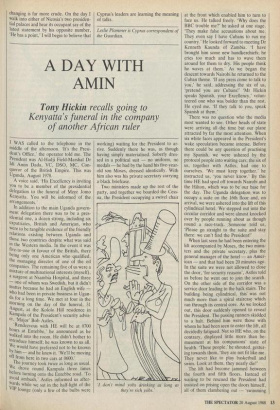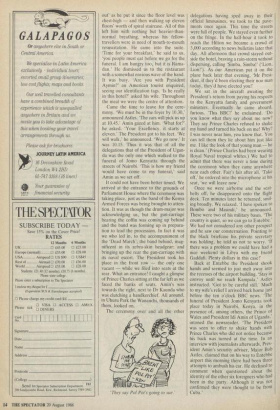A DAY WITH AMIN
Kenyatta's funeral in the company of another African ruler
I WAS called to the telephone in the middle of the afternoon. 'It's the Presi- dent's Office,' the operator told me. The President was Al-Hadji Field-Marshal Dr Idi Amin Dada, VC, DSO, MC, Con- queror of the British Empire. This was Uganda, August 1978.
A voice said, 'His Excellency is inviting you to be a member of the presidential delegation to the funeral of Mzee Jomo Kenyatta. You will be informed of the arrangements.'
In addition to the main Uganda govern- ment delegation there was to be a pres- idential one, a dozen strong, including six expatriates, British and American, who were to be tangible evidence of the friendly relations existing between Uganda and those two countries despite what was said in the Western media. In the event it was five-to-one in favour of the British, there being only one American who qualified, the managing director of one of the oil companies. The remaining five of us were a mixture of multinational interests (myself), a surgeon at Nsambia Hospital, and three — one of whom was Swedish, but it didn't matter because he had an English wife who had been in private business in Ugan- da for a long time. We met at four in the morning on the day of the funeral, 31 August, at the Kololo Hill residence in Kampala of the President's security advis- er, 'Major' Bob Astles. `Rendezvous with HE will be at 0700 hours at Entebbe,' he announced as he walked into the room. He didn't bother to introduce himself; he was known to us all. We would have preferred not to be known by him — and he knew it. 'We'll be moving off from here in two cars at 0600.' The journey took twice as long as usual. We drove round Kampala three times before turning onto the Entebbe road. `To avoid ambush,' Astles informed us after- wards while we sat in the half-light of the VIP lounge (only a few of the bulbs were working) waiting for the President to ar- rive. Suddenly there he was, as though having simply materialised. Soberly dres- sid in a political suit — no uniform, no medals — he had by the hand his five-year- old son Moses, dressed identically. With him also was his private secretary carrying a black briefcase.
Two ministers made up the rest of the party, and together we boarded the Cess- na, the President occupying a swivel chair 'I don't mind yobs drinking as long as they're rich yobs.' at the front which enabled him to turn to face us. He talked freely. 'Why does the BBC trouble me?' he asked at one stage. 'They make false accusations about me. They even say I have Cubans to run my country.' He looked forward to meeting Dr Kenneth Kaunda of Zambia. 'I have brought him some new handkerchiefs; he cries too much and has to wave them around for them to dry. His people think he waves at them.' As we began the descent towards Nairobi he returned to the Cuban theme. 'If any press come to talk to you,' he said, addressing the six of us, 'pretend you are Cubans!' Mr Hickin speaks Spanish, your Excellency,' volun- teered one who was bolder than the rest. He eyed me. `If they talk to you, speak Spanish at them.'
There was no question who the media most wanted to see. Other heads of state were arriving all the time but our plane attracted by far the most attention. When six white faces appeared in the President's wake speculation became intense. Before there could be any question of practising my Spanish, we were ushered by the protocol people into waiting cars; the six of us, together with Astles, had one to ourselves. 'We must keep together,' he instructed us, 'you never know.' By this time HE had sped off towards Nairobi and the Hilton, which was to be our base for the day. The Uganda delegation was to occupy a suite on the 16th floor and, on arrival, we were ushered into the lift of this cylindrical hotel. We stepped out into the circular corridor and were almost knocked over by people running about as though round a race-track. Someone told us, 'Please go straight to the suite and stay there: we can't find the President!'
When last seen he had been entering the lift accompanied by Moses, the two minis- ters and the private secretary, plus the general manager of the hotel — an Amer- ican — and that had been 20 minutes ago. In the suite we were not allowed to close the door, 'for security reasons', Astles told Lis before he went out to join the search. On the other side of the corridor was a service door leading to the back stairs. The building being cylindrical, this" was not much more than a spiral staircase which ran through its central core. As we looked out, this door suddenly opened to reveal the President. The passing runners skidded to a halt. Behind him were those with whom he had been seen to enter the lift, all decidedly fatigued. Not so HE who, on the contrary, displayed little more than be- musement at his companions' slate of health. 'These people,' he shouted, gestur- ing towards them, `they are not fit like me. They never like to play basketball and swim. Look at them, they nearly die!'
The lift had become jammed between the fourth and fifth floors. Instead of waiting to be rescued the President had insisted on prising open the doors himself, all of them clambering out — 'swimming out' as he put it since the floor level was chest-high — and then walking up eleven floors' worth of spiral staircase. All of this left him with nothing but heavier-than- normal breathing, whereas his fellow- travellers were in need of mouth-to-mouth resuscitation. He came into the suite. `Time for your breakfast,' he said to us, `you people must eat before we go for the funeral. I am hungry too, but it is Rama- dan.' He dismissed us to the restaurant with a somewhat envious wave of the hand. It was busy. 'Are you with President Aymin?' an American tourist enquired, seeing our identification tags. 'Is he really in this hotel?' asked his wife. Throughout the meal we were the centre of attention.
Came the time to leave for the cere- mony. 'We must be in the foyer by 10.30,' announced Astles. 'The cars will pick us up at 10.45.' Amin gazed at him. 'What for?' he asked. 'Your Excellency, it starts at eleven.' The President got to his feet. 'We will walk,' he announced. 'We go now.' It was 10.15. Thus it was that of all the delegations that of the President of Ugan- da was the only one which walked to the funeral of Jomo Kenyatta through the streets of Nairobi. 'This is how my friend would have come to my funeral,' said Amin as we set off.
It could not have been better timed. We arrived at the entrance to the grounds of Parliament House where the ceremony was taking place, just as the band of the Kenya Armed Forces was being brought to atten- tion. It was as though the drum-major was acknowledging us, but the gun-carriage bearing the coffin was coming up behind and the band was forming up in prepara- tion to lead the procession. In fact it was we who led in, to the accompaniment of the 'Dead March'; the band behind, mag- nificent in its zebra-skin headgear; and bringing up the rear the gun-carriage with its naval escort. The President took his place in the front row — the only one vacant — while we filed into seats at the rear. What an entrance! I caught a glimpse of Prince Charles sitting at the far left as we faced the banks of seats. Amin's was towards the right, next to Dr Kaunda who was clutching a handkerchief. All around, in Uhuru Park the Wananchi, thousands of them, looked on.
'They say Pot Pot's going to sue.' delegations having sped away in their official limousines, we took to the pave- ments once again. This time the streets were full of people. We stayed even further on the fringe. In the half-hour it took to reach the Hilton we became a crowd of 3,000 according to news bulletins later that day. All afternoon that crowd stayed out- side the hotel, braving a rain-storm without dispersing, calling `Simba, Simba!' (`Lion, Lion!'). As our American put it on the plane back later that evening, `Mr Presi- dent, if they'd been electing their noo man today, they'd have elected you!'
We sat in the aircraft awaiting the President's return from paying his respects to the Kenyatta family and government ministers. Eventually he came aboard, furious. 'This BBC!' he exclaimed. 'Do you know what they say about me now? They say Prince Charles refused to shake my hand and turned his back on me! Why? I was never near him, you know that. You can tell them they lie about him just like me. I like the look of that young man — he is clean.' (Prince Charles had been wearing Royal Naval tropical whites.) We had to admit that there was never a time during the ceremony when they came anywhere near each other. Fair's fair after all. 'Take off,' he ordered into the microphone at his seat, 'we will leave now.'
Once we were airborne and the seat- belts off, he disappeared onto the flight deck. Ten minutes later he returned, smil- ing broadly. We relaxed. 'I have spoken to Bombo and Masindi,' he announced. These were two of his military bases. 'The country is quiet, so we can go to Entebbe.' We had not considered any other prospect and he saw our consternation. Pointing to the black briefcase his private secretary was holding, he told us not to worry. `If there was a problem we could have had a nice weekend in Libya with my friend Gaddafi. Plenty dollars in this case!'
Back at Entebbe the President shook hands and seemed to just melt away into the recesses of the airport building. 'Stay in convoy until we reach Kampala,' Astles instructed. 'Got to be careful still.' Much to my wife's relief I arrived back home just before the ten o'clock BBC news. 'The funeral of President Jomo Kenyatta took place today in Nairobi, Kenya, in the presence of, among others, the Prince of Wales and President Idi Amin of Uganda,' intoned the newsreader. 'The President was seen to offer to shake hands with Prince Charles who did not notice because his back was turned at the time. In an interview with journalists afterwards, Pres- ident Amin's security adviser, Major Bob Astles, claimed that on his way to Entebbe airport this morning there had been three attempts to ambush his car. He declined to comment when questioned about the identity of the other six foreigners who had been in the party. Although it was not confirmed they were thought to be from Cuba.'























































 Previous page
Previous page